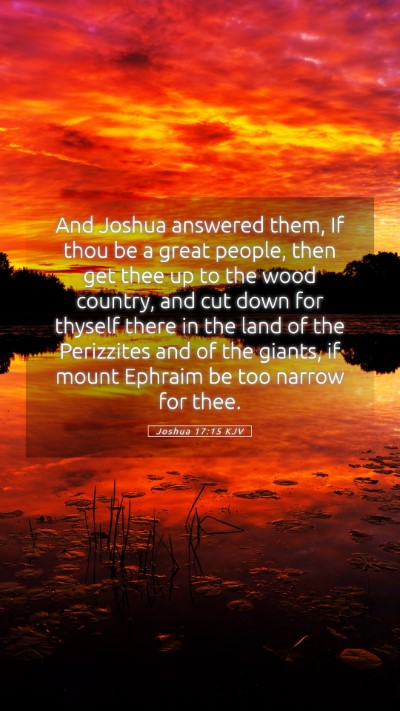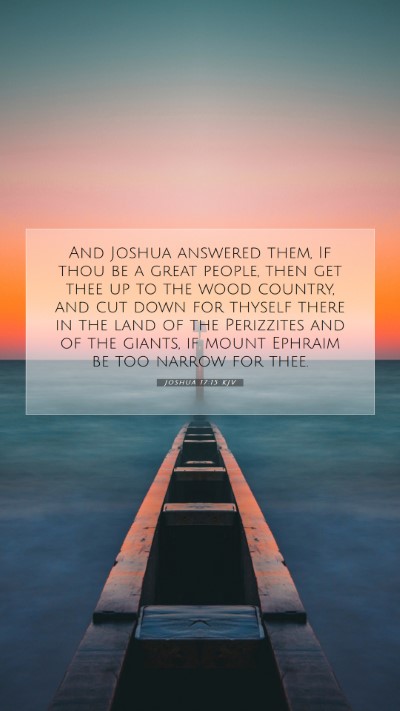Old Testament
Genesis Exodus Leviticus Numbers Deuteronomy Joshua Judges Ruth 1 Samuel 2 Samuel 1 Kings 2 Kings 1 Chronicles 2 Chronicles Ezra Nehemiah Esther Job Psalms Proverbs Ecclesiastes Song of Solomon Isaiah Jeremiah Lamentations Ezekiel Daniel Hosea Joel Amos Obadiah Jonah Micah Nahum Habakkuk Zephaniah Haggai Zechariah MalachiJoshua 17:15 Meaning
What is the meaning of Joshua 17:15?
And Joshua answered them, If thou be a great people, then get thee up to the wood country, and cut down for thyself there in the land of the Perizzites and of the giants, if mount Ephraim be too narrow for thee.
Joshua 17:15 Bible Verse Meaning
Bible Verse Meaning: Joshua 17:15
The verse Joshua 17:15 states: "And Joshua answered them, If thou be a great people, then get thee up to the forest, and cut down for thyself there in the land of the Perizzites and of the giants, if Mount Ephraim be too narrow for thee."
Understanding Joshua 17:15
This verse comes from a narrative where the tribes of Joseph, specifically the descendants of Ephraim and Manasseh, were expressing dissatisfaction with their allotment of land. They perceived it to be insufficient given their size and population. The response of Joshua reflects not only practical leadership but also a deeper message about faith, responsibility, and action.
Insights from Commentaries
-
Matthew Henry:
Henry emphasizes that Joshua’s response is both a challenge and an encouragement. He urges the descendants of Joseph to take initiative. Their frustration about land allocation is countered with a call to action—if they believe they are a great people, they should act like it. Instead of simply complaining, they need to take ownership of their situation.
-
Albert Barnes:
Barnes notes the historical context regarding the land of the Perizzites, which represents both a challenge and an opportunity. He highlights that the mention of giants indicates obstacles that must be conquered. This reflects a broader theme within Scripture about overcoming challenges through faith and courage. Joshua’s suggestion implies that growth often requires pressing beyond current limits and confronting difficulties.
-
Adam Clarke:
Clarke elaborates on the nature of the forest land and its potential for cultivation. He indicates that such a task requires effort and risk but also brings with it the promise of greater rewards. Clarke connects this passage to the understanding that God’s promises often require human cooperation and effort, reinforcing the principle that faith without works is dead (James 2:26).
Theological Reflections
The overarching message in Joshua 17:15 engages with themes of personal responsibility in relation to divine promises. Both leaders and members of God's community must respond actively to what God lays before them. This interaction reflects a continuum where divine providence meets human initiative, confirming the importance of faith being backed by action.
Application in Daily Life
For modern readers, this verse poses significant questions about taking ownership of one's circumstances. Much like the tribes of Joseph who were tasked to claim their inheritance, individuals today are called to recognize their potential and work towards it. Whether in personal, communal, or spiritual endeavors, this passage encourages believers not to shy away from challenges but to rise up and make the most of the resources available to them.
Cross References
- Numbers 32:20-22: The call for the tribes to engage proactively in claiming the land.
- Joshua 1:9: God’s assurance to Joshua about being strong and courageous.
- Romans 12:1-2: The call to present our bodies as a living sacrifice, which resonates with taking initiative in our faith.
Conclusion
Joshua 17:15 serves as a critical reminder for believers to embrace their responsibilities and to step forward in faith when facing challenges. Understanding Scripture in context allows for deeper theological insight and application, making this verse a vital tool for study in Bible groups, online Bible study, and personal devotion.


